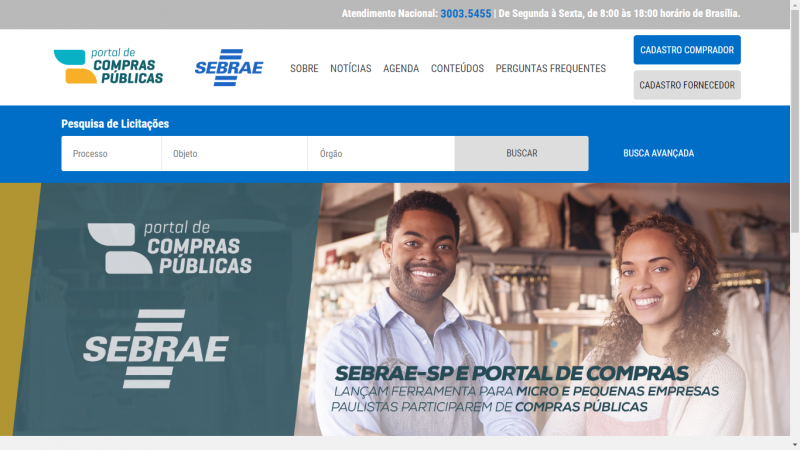Source: Portal Empreendedor
15/09/2021
The platform enables bids for almost 40% of the country’s city halls, including São Paulo’s, and is expected to move R$60 billion in purchases in 2021.
The Public Procurement Portal is a private electronic procurement platform in the country and has reached a historic milestone in its journey since 2016, when it began operating independently in the sector – it has reached 2,000 municipalities served, which represents 36% of all 5,570 municipalities in the country. Among these municipalities are those of capitals such as São Paulo (SP), Porto Alegre (RS), Vitória (ES), and Palmas (TO). To serve this universe, the Portal built a base of 230 thousand registered suppliers, from all regions.
Today, about R$250 million in public purchases are bid for daily via the platform, which should lead the company to double the volume transacted last year, reaching R$60 billion in 2021. “It is an exceptional mark, almost 40% of the Brazilian municipalities buying with our platform,” celebrates the Portal’s CEO, Leonardo Ladeira. “And giving this achievement the flavor of ‘crown jewel,’ the City of São Paulo, which is the largest metropolis in Latin America, also started to make acquisitions with the Public Procurement Portal. To give you an idea of what this means in terms of business volume, the Gross Domestic Product (GDP) of the City of São Paulo is equivalent to the sum of 4,305 Brazilian municipalities together, and its population exceeds by 3 million the entire population of Portugal, for example.
The niche of Public Procurement for the small
The figures indicate that an average of 8,500 business opportunities are being generated per day, which amounts to more than 180,000 every month for suppliers that want to sell to governments. Public procurement represents a slice around 12% of the Brazilian Gross Domestic Product (GDP) and moved more than R$900 billion in 2019, according to the Ministry of Economy. “It is a market that cannot be disregarded by companies of any size,” highlights Ladeira.
For this reason, the Portal has been developing regional partnerships with SEBRAE since 2020, aiming to encourage small entrepreneurs to participate in this huge business niche and, on the other end, the municipalities to buy from local small entrepreneurs. “The municipalities can also not fail to take advantage of the potential of their small businesses, enabling a new increment to the development of the local and regional economy,” argues the CEO.
The Portal already has partnerships underway in this sphere in Pará, Paraná, and São Paulo, and the results prove that public procurement is also a market for small businesses. “Currently, two thirds of the bids won in the Portal are from micro and small companies, demystifying the maxim that only big companies can sell to governments,” reveals the executive.
Solution in Pandemic and Pregão Eletrônico
The Public Procurement Portal has quintupled the number of municipalities served and also the number of suppliers in the last two years, in the middle of the economic crisis generated by the coronavirus pandemic. Besides the focus on small business, two other factors were fundamental for this performance. The first is that the platform operates 100% digitally. As a govtech startup specialized in developing technological solutions for governments, the Portal offers tools for municipalities and public agencies to make their purchases entirely over the Internet, connecting them with registered suppliers from all over the country.
It was the ideal solution to keep the municipal public machine running during the pandemic, because it does not require any physical contact between the city hall teams, suppliers, or with the Portal’s service. The platform, in fact, has made possible thousands of municipal purchases necessary to combat the virus and care for the victims.
The second factor was the entry into force of the new Electronic Auction Decree (10,024/2019), which made this method mandatory for all municipalities that use funds from voluntary transfers from the Union. They are the main source of funds for more than 90% of Brazilian municipalities. As most of them (73%) have between 10 thousand and 20 thousand inhabitants (IBGE/2020), the difficulties in adapting to the requirements of the new law were enormous, and the Portal undertook intensive training and qualification work to prepare municipalities from all over the country to migrate to digital platforms, and start making their acquisitions via electronic bidding.
“We don’t stop at any point,” Ladeira points out. “We are working in all regions of the country to capitalize on potential users joining our platform and tools, establishing the Portal as the best bidding solution for the municipal sphere,” says the CEO. “At the same time, we are helping to foster technological innovation within the government and the development of entrepreneurship throughout Brazil,” boasts the executive, who credits the great performance to the team spirit of the platform’s employees.
GPTW and Govtech Seals
“It’s no wonder that in November we received the Great Place to Work (GPTW) certification, a seal conferred by this global consultancy that supports organizations to obtain better results through a culture of trust, high performance, and innovation”, he recalled. GPTW attests that Portal is a Great Place to Work, after a detailed survey with the company’s employees that pointed to an 89% satisfaction rate.
Also at the end of the year, Portal received the GovTech seal from BrazilLAB, the first innovation Hub of the area in the country, in recognition that it is an innovative company for the public sector. With this, he became part of a network of entrepreneurs who have technological solutions for various government challenges, whether in the municipal, state, or federal sphere, and even in the Legislative and Judiciary. “It is a great source of pride to see all these results from our unceasing efforts and the conviction that public procurement is a market niche that is increasingly important and accessible to entrepreneurs of all sizes and regions,” says its CEO, Leonardo Ladeira.

